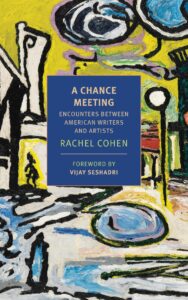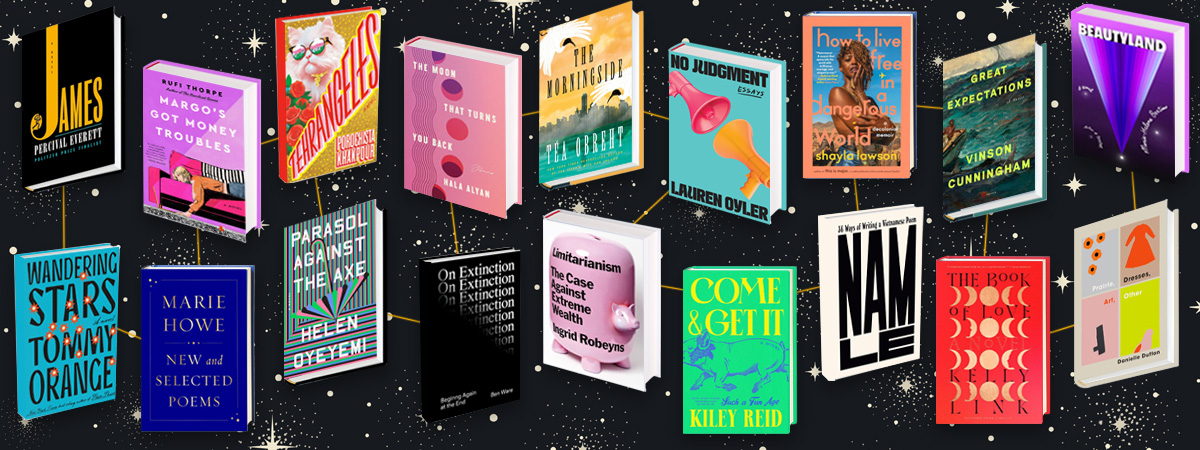
Lit Hub’s Most Anticipated Books of 2024
230 Books We’re Looking Forward to Reading This Year
MARCH
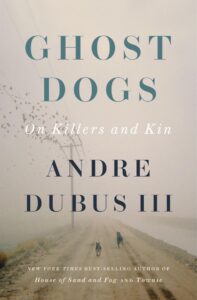
Andrew Dubus III, Ghost Dogs: On Killers and Kin
W.W. Norton, March 5
A decade after his essential memoir Townie, Dubus delivers career-defining suite of essays about working hard, growing up, and growing older. The book includes “If I Owned a Gun,” his powerful interrogation of guns and masculinity and why he ultimately gave up owning a weapon. –DB
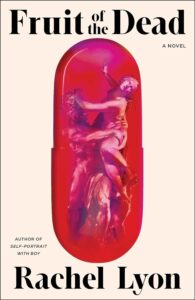
Rachel Lyon, Fruit of the Dead
Scribner, March 5
When an 18-year-old camp counselor gets swept away to an isolated island as the nanny for a shady pharma billionaire’s kids, her mother sets off to find her and bring her back. I’m a sucker for a good myth-retelling, especially when it doesn’t sweat the plot points too hard, and so I’m very excited for Lyon’s riff on Persephone & Demeter. Pharma billionaire Hades? Yes please. –DB
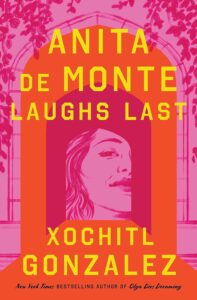
Xochitl Gonzalez, Anita de Monte Laughs Last
Flatiron, March 5
In 1998, art history student Raquel is struggling to find a place at her elite college where the majority of students are white. But when she starts dating a popular older student, she suddenly finds herself at the top of the social ladder. That’s when Raquel discovers the story of artist Anita de Monte. A rising star who died tragically in 1985, Anita’s story is strangely similar to Raquel’s own, and it forces Raquel to reconsider her own life and relationships. Told by both Anita and Raquel, Gonzalez’s newest novel is a dynamic exploration of love, art, and power. –McKayla Coyle, publishing coordinator
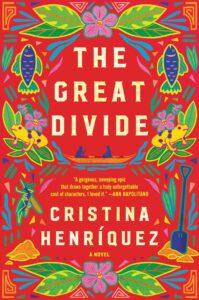
Cristina Henríquez, The Great Divide
Ecco, March 5
The Great Divide is an epic story told from the perspective of ordinary people. Following the intersecting lives of three characters living in Panama, this historical novel tells the story of the Panama Canal’s construction. Omar is a Panamanian fishmonger who takes a job working on the canal, Ada Bunting is a teenage stowaway from Barbados trying to raise money for her sister’s surgery, and John Oswald is a scientist working to eradicate malaria. When these three meet on the banks of the Panama Canal, their lives are forever changed. A compassionate and insightful historical epic. –MC
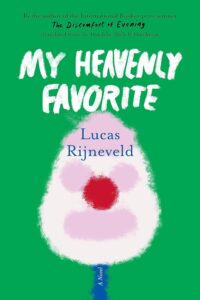
Lucas Rijneveld, trans. Michelle Hutchinson, My Heavenly Favorite
Graywolf, March 5
Here comes a novel that wears its debt to Lolita—is it just me, or are we seeing a lot of novels lately that are taking Nabokov’s classic and running with it?—pinned on its chest with abject pride. After winning the International Booker Prize in 2020 with The Discomfort of Evening, Rijneveld returns with a novel narrated by a disgraced veterinarian who falls for the daughter of a farmer in rural Netherlands, a protean girl on the edge of puberty who’d much prefer a boy’s body. –SR
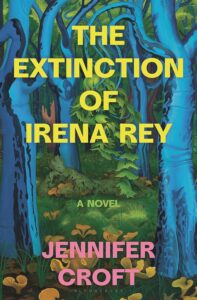
Jennifer Croft, The Extinction of Irena Rey
Bloomsbury, March 5
You’ve read the work of brilliant translator Jennifer Croft before—the translation from Polish of Nobel laureate Olga Tokarczuk’s Flights and The Books of Jacob (also Romina Paula’s August and Sylvia Molloy’s Dislocations, among others). Her debut novel, The Extinction of Irena Rey, follows eight translators who gather in Białowieża forest to meet with world-renowned author Irena Rey in order to translate her magnum opus, Gray Eminence. But within days of their arrival, Irena disappears and the translators, slavishly devoted to “Our Lady of Literature,” attempt to find her. In an interview with the New York Times, Croft says, “Translators overwrite originals, making texts in other languages visible and invisible at once. Without translators, literary traditions and even languages might rot in isolation. With translators, the literary ecosystem keeps up the diversity it needs in order to flourish.” With this knowledge, The Extinction puts translators first, and with humor and grace explores art, celebrity, and the power of language. –Emily Firetog, deputy editor
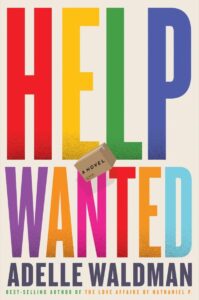
Adelle Waldman, Help Wanted
W.W. Norton, March 5
As a fan Waldman’s very funny, painfully familiar debut The Love Affairs of Nathaniel P., I’ve been impatiently awaiting her sophomore novel for years. It comes in the form of a workplace comedy about the employees at big box store in upstate New York as they compete for a management position, which sounds like the perfect showcase for Waldman’s skill in both ruthless character study and dark comedy. –JG
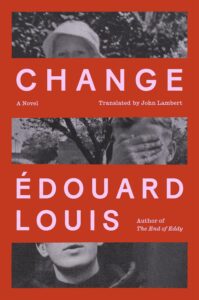
Édouard Louis, trans. John Lambert, Change
FSG, March 5
Thirty-one-year-old Édouard Louis writes some of the best nonfiction published today, full stop. I can’t wait to read his latest, billed as an autobiographical novel, in which “Eddy” becomes Édouard, leaving behind his violent, working-class hometown for Paris, a life of the mind, and the relentless pursuit of becoming someone else (which is, of course, another kind of violence). –ES

Helen Oyeyemi, Parasol Against the Axe
Riverhead, March 5
Any year we get a new Helen Oyeyemi is cause for celebration, but I’m particularly excited about this fun, absurdist pitch: two estranged friends, a bachelorette party in Prague, and a book called Paradoxical Undressing that changes every time it’s read. Oh, and evidently Parasol Against the Axe is written from the perspective of Prague itself. I’m all in. –ES
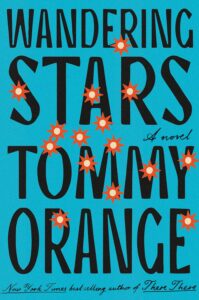
Tommy Orange, Wandering Stars
Knopf, February 27
Cheyenne and Arapaho Tribe member Tommy Orange’s first book, the critically acclaimed short story collection There There, was a full-blown literary sensation upon its release in 2018, winning both the National Book Critics Circle John Leonard Prize and the PEN/Hemingway Award. It was also a finalist for the Andrew Carnegie Medal for Excellence in Fiction and the 2019 Pulitzer Prize, as well as a New York Times bestseller. Not bad for a debut. His highly anticipated sophomore novel, Wandering Stars, traces the legacies of the Sand Creek Massacre of 1864 and the notorious Carlisle Indian Industrial School through three generations of a family. –DS
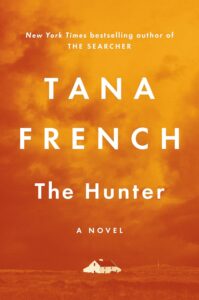
Tana French, The Hunter
Viking, March 5
French returns to the same small town in the west of Ireland where she set The Searcher, picking up the story of Cal and Trey, who find themselves embroiled in yet another murderous mystery to do with the Reddys. You needn’t have read The Searcher to appreciate this novel—which is wonderfully evocative, entertaining and propulsive all the way through, even if I still miss the magic-tinged weirdness of French’s Dublin Murder Squad series—but it helps to understand some of the motivations. Besides, there are worse reasons to revisit a good book. –ET
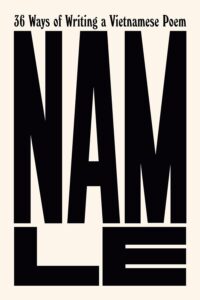
Nam Le, 36 Ways of Writing a Vietnamese Poem
Knopf, March 5
While I am normally very skeptical of blurbs, it’s hard to ignore praise from J.M. Coetzee AND Nick Cave, both of whom rave about Nam Le’s ambitious book-length poem, 36 Ways of Writing a Vietnamese Poem. Le, who burst onto the international literary scene with his 2008 story collection, The Boat, continues to grapple with the complexities and contradictions of the diaspora experience, at once articulating the racism and oppression of life as a refugee while also expressing a need to not be defined by that experience. –JD
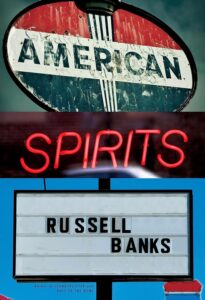
Russell Banks, American Spirits
Knopf, March 5
Russell Banks, who died a year ago next week, has always been a master at elevating the small calamities of everyday American life into full-blown tragedy, revealing all the dark ways our grief and despair can spill into something larger, more menacing, than we ever imagined. With his final novel, American Spirits, Banks takes us to upstate New York with three connected stories of small-town life gone very wrong. –JD
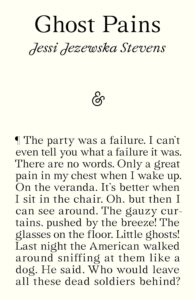
Jessi Jezewska Stevens, Ghost Pains
And Other Stories, March 5
Another book making the case for 2024 being a banger of a year for short fiction, Ghost Pains collects Stevens’ fiction from The Baffler, Harpers, The Paris Review and elsewhere into a “shambolic” journey. (I’m in.) Fans of The Exhibition of Persephone Q and slightly hallucinatory The Visitors will be excited to see where she takes them next. –JM
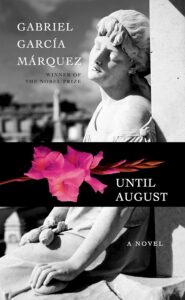
Gabriel García Márquez, trans. Anne McLean, Until August
Knopf, March 12
Until August was Gabriel García Márquez’s last novel; he finished it near the end of his life, while he was struggling with dementia, but ultimately decided it shouldn’t be published. Now, ten years after his death, his sons are releasing the book, which is being described as “an extraordinary and profound tale of female freedom and desire.” One final work from a literary master will certainly be worth a look. –ET
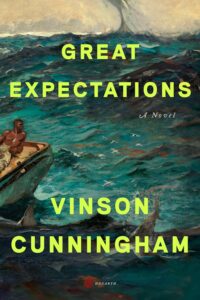
Vinson Cunningham, Great Expectations
Hogarth, March 12
Vinson Cunningham is a brilliant culture writer and theater critic whose New Yorker pieces have made him one of the magazine’s rising stars, so I was delighted to see that the 2020 National Magazine Award finalist has now written a novel. Great Expectations is the story of a young Black man who goes to work for the presidential campaign of a charismatic Illinois senator (Cunningham previously served as a staff assistant at the Obama White House), along the way encountering “a myriad of people who raise a set of questions … that force David to look at his own life anew and come to terms with his identity as a young Black man and father in America.” –DS
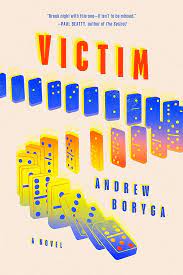
Andrew Boryga, Victim
Doubleday, March 12
In Boryga’s debut novel, Victim, a hustler on the rise learns to manipulate the currency of identity as he bends the truth about his past and establishes himself in the world of New York media and letters. The satire in this novel comes in sharp and merciless, but the friendship at the story’s center steals the show, rounding out all the complexities and contradictions of two young men on different sides of the truth. Boryga is a keen observer of culture and a talented storyteller with style to spare. –DM
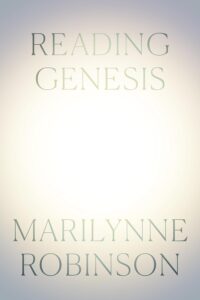
Marilynne Robinson, Reading Genesis
FSG, March 12
You’ve read Genesis, but have you really read it? As a piece of literature, that is, as opposed to a historical document or madlib composed by multiple people over multiple centuries? Honestly, an interesting project for Gilead’s Robinson, who gives pre-Milton Eden the proper treatment. –JM
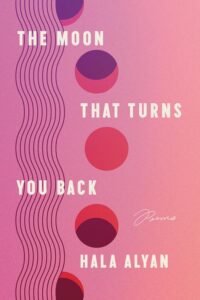
Hala Alyan, The Moon That Turns You Back
Ecco, March 12
Palestinian-American poet, novelist, and clinical psychologist Hala Alyan, a recipient of both the Dayton Literary Peace Prize and the Arab American Book Award, has been an essential voice in these dark, devastating times. She writes about the complexities of displacement and exile, the nature of home, and the dehumanizing nature of the western gaze (“They like me in a museum. / They like me when I spit my father from my mouth”) with incredible lyricism, beauty, and fury. Her new collection of poetry, The Moon That Turns You Back, “traces the fragmentation of memory, archive, and family—past, present, future—in the face of displacement and war.” –DS
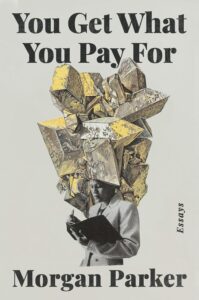
Morgan Parker, You Get What You Pay For: Essays
Random House, March 12
I queue up to read Morgan Parker, and you should too. In her debut essay collection, the award-winning author of Magical Negro pursues a personal and cultural history of life as a Black woman in America. Weaving personal narrative with current events and historical context, Parker delivers a must-read account of her own psyche, written with the precision and lyricism of a poet. –ES
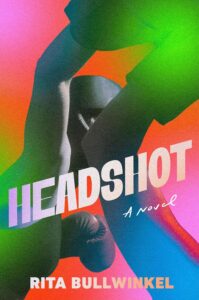
Rita Bullwinkel, Headshot
Viking, March 12
Welcome to the 12th Annual Women’s 18 & Under Daughters of America Cup at Bob’s Boxing Palace, and to Bullwinkel’s sports novel that reads like an opera. Alongside dialogue-less accounts of fights that are hypnotically intense, we get the girls’ backstories and the moments that brought them to the ring. “Usually, as a tournament progresses, there is a feeling of whittling, of a group of many reduced to a single champion, but here in Bob’s Boxing Palace, at the Daughters of America tournament, as each bout has been fought, there has been the feeling of accumulation.” Bullwinkel’s 2018 story collection Belly Up was beautiful and strange, and the novel has the same intensity of characters and unpacking of the human spirit, with the narrative arc of every great sports story. –EF
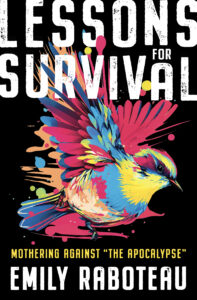
Emily Raboteau, Lessons for Survival: Mothering Against “The Apocalypse”
Henry Holt, March 12
An instant cornerstone of what I see as the emerging motherhood-climate genre (Mobility, The Quickening), Lessons for Survival was reported out by Raboteau as a multi-continent journey for stories of mothers trying to help their kids thrive. There are Indigenous stories amid changing ecological patterns, of course, but also meditations on life in cities amid pollution, and the intersection of race and quality of life. –JM
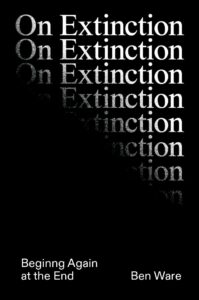
Benjamin Ware, On Extinction: Beginning Again At The End
Verso, March 12
It is foolhardy to think we can reverse the devastating effects of the climate crisis—and the immense threat to human existence they pose—with anything but the most radical change in course. Sadly, with every passing month, that change seems impossible. What philosopher Ben Ware is asking, then, is for us to imagine—to internalize—the reality of human finitude, the end of us. Only then, he suggests, will we be able to take in the full horizon of what we’ve wrought and, perhaps, move forward into a new and radical version of our shared future. –JD
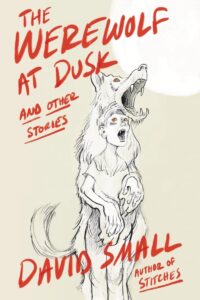
David Small, The Werewolf at Dusk: Stories
W.W. Norton, March 12
An interesting trio of illustrated stories, one original and two adaptations. The title story is an adaptation of Lincoln Michel’s tale of an aging werewolf, there’s an adaptation of Jean Ferry’s most famous story “Le Tigre Mondain,” and Small adds an original about a man lost on dreamlike streets. All three are brought together by Small’s gorgeous illustrations. –DB
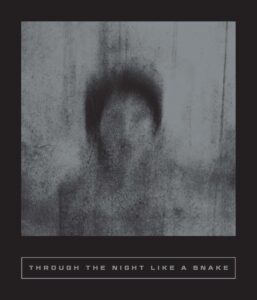
Various, Through the Night Like a Snake: Latin American Horror Stories
Two Lines Press, March 12
The latest in Two Lines’ terrific Calico imprint, dedicated to bringing yet-untranslated stories and writers into English in community. This one rides a wave of interest in Latin American horror and features stories from translation sensations like Mariana Enriquez and Monica Ojeda as well as writers making their English-translation debut. It’s guaranteed to be a weird, unsettling, and beautiful collection. –DB
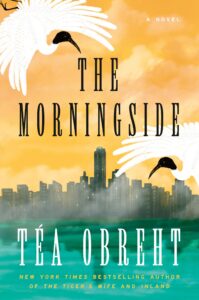
Téa Obreht, The Morningside
Random House, March 19
Obreht is known for her masterful, myth-touched epics, but as it turns out, she can do slender and incisive as well as she can do sweeping. (This novel is still myth-touched, though.) Not too long from now, a girl named Silvia lives in a once-luxurious tower in a place called Island City, half-underwater, and half-lawless, the tides and crimes reported by an underground radio host whose identity is a mystery. Silvia and her mother came from somewhere far away—but Silvia doesn’t understand exactly why they had to leave, or why her mother has sworn her to secrecy about their origins. Then there’s the mysterious woman who lives in the penthouse, who might or might not be a magical creature who could fix (or destroy) everything. I won’t give any more away, except to say that like all of Obreht’s work, The Morningside is filled with tiny moments of acute observation and beautiful writing that will make you stop and gasp, and also like all of Obreht’s work, you’ll be thinking about it all long after you’ve finished reading. A magical, special book by one of our best working novelists. –ET
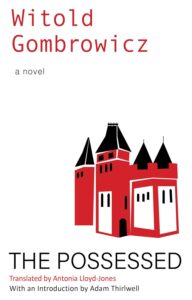
Witold Gombrowicz, trans. Antonia Lloyd-Jones, The Possessed
Black Cat, March 19
Polish novelist Witold Gombrowicz is a genius of the absurd (read his masterpiece Cosmos); more English speakers should read him. Here’s a good opportunity: The Possessed, an early Gombrowicz novel that Grove’s Black Cat is publishing in a new translation by Antonia Lloyd-Jones, is a pastiche of the Gothic novel featuring “bewitched towels, conniving secretaries, famous clairvoyants, uncanny doubles” and a mad prince. Can’t wait. –ET
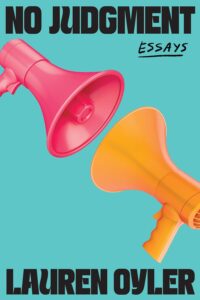
Lauren Oyler, No Judgement: Essays
HarperOne, March 19
Oyler is one of our most delightful working critics, not least because she’s not afraid to be actually, you know, critical. Her first collection contains eight new essays, the topics being (according to her website) “revenge, gossip, Goodreads, expats, autofiction, vulnerability, anxiety, and spoilers.” So basically all my favorite topics… –ET
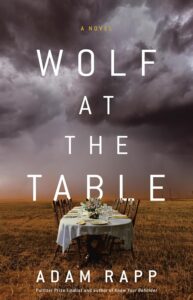
Adam Rapp, Wolf at the Table
Little Brown, March 19
I’ve been a fan of Rapp’s brand of visceral human storytelling since his upstart-playwright days and his new novel looks like a doozy: a multi-generational saga about a family with a potential serial killer in their midst. What could be more quintessentially American? –DB
Rachel Cohen, A Chance Meeting: Encounters Between American Writers and Artists
NYRB Classics, March 19
“The thirty people gathered here met in ordinary ways,” Cohen writes in the introduction to this treasure trove, originally published in 2004. “A careful arrangement after long admiration, a friend’s casual introduction, or because they both just happened to be standing near the drinks.” These aren’t just any thirty people, of course, but rather American cultural icons from Walt Whitman to Gertrude Stein to Willa Cather Marcel Duchamp to Zora Neale Hurston to James Baldwin to John Cage, whose meet-cutes (or meet-plains) are collected in this fascinating, genre-bending treasure trove. –ET
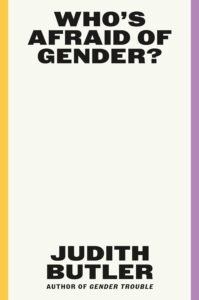
Judith Butler, Who’s Afraid of Gender?
FSG, March 19
We all love Judith Butler. If Gender Trouble, published in 1990, gave us the tools to speak more expansively about gender and the human experience, something seems to have been lost in translation by bad actors since. Who’s Afraid of Gender brings us up to today, and explains “how ‘gender’ has become a phantasm for emerging authoritarian regimes, fascist formations, and transexclusionary feminists.” –JM
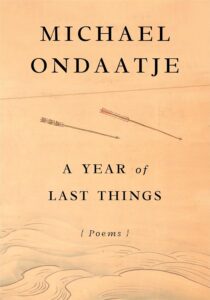
Michael Ondaatje, A Year of Last Things
Knopf, March 19
By my counting, Ondaatje is now 80 and has published seven novels (including, yes, The English Patient), 13 books of poetry and a host of other anthologies and such. Next up, the Sri-Lankan-Canadian (“I’m not much of a Tamil now,” he told The Guardian in 2011) is turning back to his past with a poetry collection in which we “journey back through time by way of alchemical leaps, unearthing writings by revered masters, moments of shared tenderness, and the abandoned landscapes we hold on to to rediscover the influence of every border crossed.” –JM
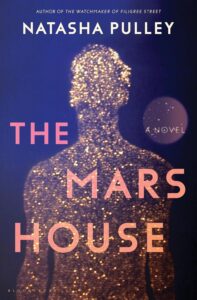
Natasha Pulley, The Mars House
Bloomsbury, March 19
Pulley (The Watchmaker of Filigree Street) turns her eyes to the future in what is already one of my favorite books of the year. A couple hundred years from now, January, the former principal ballerina of the London Ballet flees a flooding London and ends up as an undocumented immigrant on Mars. He ends up in a marriage of convenience with Aubrey Gale, a handsome, xenophobic, anti-Earther political candidate—but as January and Gale start to warm to each other, the political scene on Mars deteriorates and then an existentially threatening sandstorm descends. There’s palace intrigue, a slow-burn enemies-to-lovers plot, sassy footnotes, and also there are mammoths! It’s a total delight from start to finish. –DB
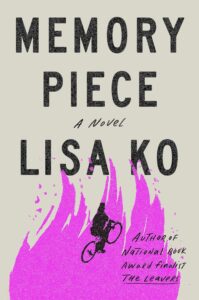
Lisa Ko, Memory Piece
Riverhead, March 19
Ko’s gorgeous debut The Leavers broke my heart in the best way, so I’m delighted to turn myself over to her latest novel, which tells the story of three childhood friends, “allied in the weirdest parts of themselves,” from the 1980s to the 90s to the 2040s. It’s an ambitious premise, and I’m especially excited to read Ko’s portrait of the near-ish future. –JG
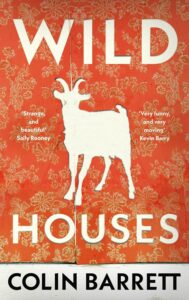
Colin Barrett, Wild Houses
Grove, March 19
Barrett is one of the most brilliant short story writers working today, with the sentence-level confidence of someone with a dozen books under his belt. His debut novel, Wild Houses, treads similar terrain as his short stories—the quiet loneliness of men and boys, the constant threat of violence, the claustrophobic world of a rural Irish town. Here, a small town drug dealer, a kidnapping, and a rescue intersect with tragic results, not to mention Barrett’s trademark verbal brilliance and deeply felt pathos. –EF
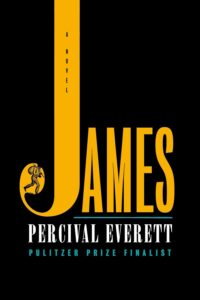
Percival Everett, James
Knopf, March 19
Everett’s 24th novel is “a harrowing and ferociously funny retelling of The Adventures of Huckleberry Finn from the enslaved Jim’s point of view.” While many narrative set pieces of Huck Finn remain (floods and storms, unexpected death and treasure, the scam artists posing as the Duke and Dauphin…), Jim’s agency, intelligence, and compassion reveal a darkness that Twain’s sentimentality could never showcase. Put this (will-be) award-winner on your TBR list. –EF
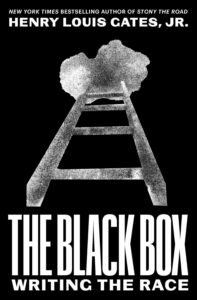
Henry Lous Gates, Jr., The Black Box: Writing the Race
Penguin Press, March 19
At once a work of literary criticism, American history, and sociocultural analysis, Gates’s Black Box—based in part on a course he teaches at Harvard—reveals the ways in which Black literature has preserved a space for a people otherwise denied freedom of movement (both literally and figuratively) in their own country. With close readings of texts by Phillis Wheatley, Frederick Douglass, W.E.B. Du Bois, Zora Neale Hurston, James Baldwin, Toni Morrison and more, Gates Jr. tells a story of survival, of Black Americans creating a “nation within a nation” and the indelible culture that goes with it. –JD
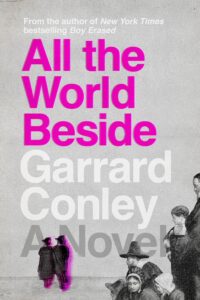
Garrard Conley, All the World Beside
Riverhead, March 26
Historical fiction buffs may have known that the Great Awakening concerned the rise in the 18th century of Protestant evangelists (I did not), who jazzed up religion somewhat from the staid old form into something more personal, more emotional, and more contingent on sinners accepting His word to avoid being burned in hell. Into this setting, Boy Erased author Conley has put New England Reverend Nathaniel Whitfield and the man, Christian physician Arthur Lyman, who falls in love with him. The stakes are high, nigh smoking, for Lyman, Whitfield, and Whitfield’s family who find themselves cast out of the community. –JM
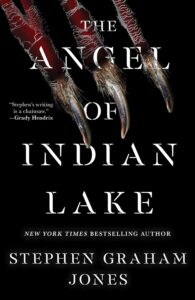
Stephen Graham Jones, The Angel of Indian Lake
Saga, March 26
Stephen Graham Jones is the absolute king of horror these days and this final installment in his Indian Lake trilogy should be a total blockbuster. Final girl Jade Daniels returns to Proofrock, Idaho after four years in prison following the end of Don’t Fear the Reaper, and the town has changed—not for the better. But one thing’s guaranteed: the curse of the Lake Witch is going to leave another trail of blood across Daniels’ life before everything is said and done. SGJ has gone all-out in this trilogy, crafting a saga of intergenerational trauma with an encyclopedic knack for horror, and this is a totally thrilling conclusion. –DB
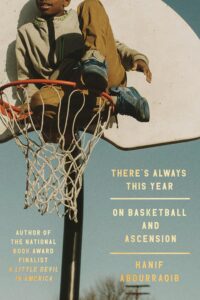
Hanif Abdurraqib, There’s Always This Year: On Basketball and Ascension
Random House, March 26
Everything Hanif Abdurraqib (A Little Devil in America) writes—music criticism, poetry, personal essays, tweets about his dog, analysis of NBA oddballs—is worth reading. The depth of insight and humanity he brings to his writing is a marvel. A lifelong basketball fan (who also happens to have come of age in Ohio during LeBron’s rise), Abdurraqib’s latest is a meditative exploration of “what it means to make it, who we think deserves success, the tension between excellence and expectation, and the very notion of role models.” If you buy it on publication day, you’ll have almost a whole month to get it finished before the playoffs start. –DS
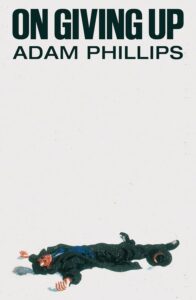
Adam Phillips, On Giving Up
FSG, March 26
It’s finally here, the book we didn’t know we needed, in which acclaimed psychoanalyst Adam Phillips tries to answer a question familiar to us all: When should we give up? Maybe it’s ok to let go of your need for closure with your cousin… And maybe it’s ok to admit you’ll never fully quit smoking… Insofar as Phillips’s project here is to pop the hood on society’s collectivized expectations of modern life, and how they affect us individually—more often than not in a negative way—this book could also be called What Really Matters. But that wouldn’t be quite so fun, would it? –JD
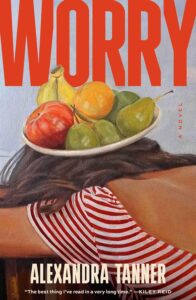
Alexandra Tanner, Worry
Scribner, March 26
Worry is within the genre of the millennial malaise lit-girl novel. It’s written in a spare and disaffected tone, about a 20-something in Brooklyn, but instead of centering around situationships and unimpressive men, this one centers another far more interesting relationship: sisterhood. Jules is living alone in Brooklyn when her younger sister, Poppy comes to stay indefinitely. They have that specific sister relationship where they both need each other desperately, and yet in some way hate each other for needing them back. It’s a microcosm of intimacy, a bond from the beginning of time that’s more real and personal than any other, and I am constantly fascinated and saddened by how we treat those we love more than anyone. Alexandra Tanner is an author to watch: she’s both funny and serious, snarky and sweet, and gives us that rare, realistic window into recognizable life. –JH









